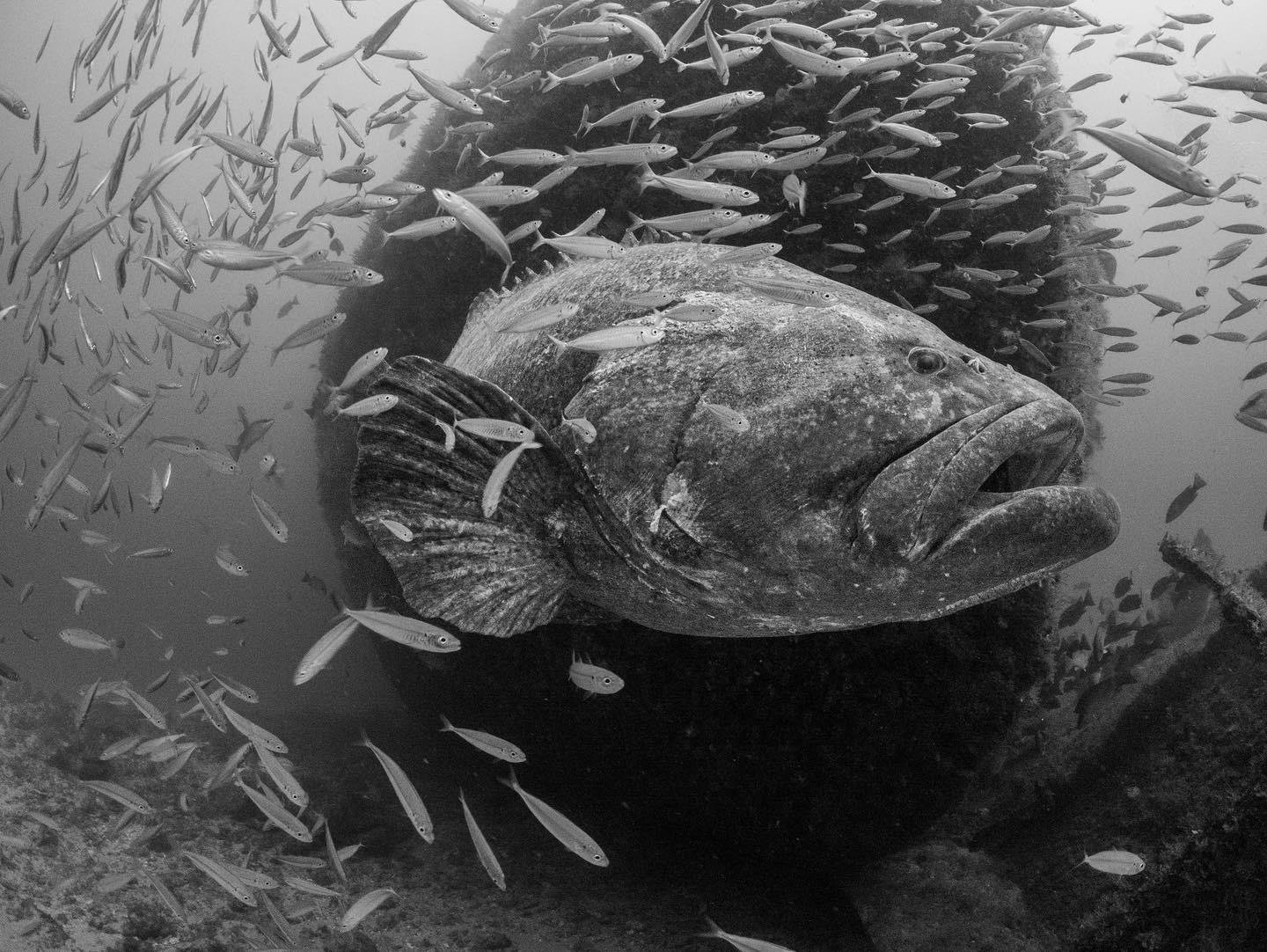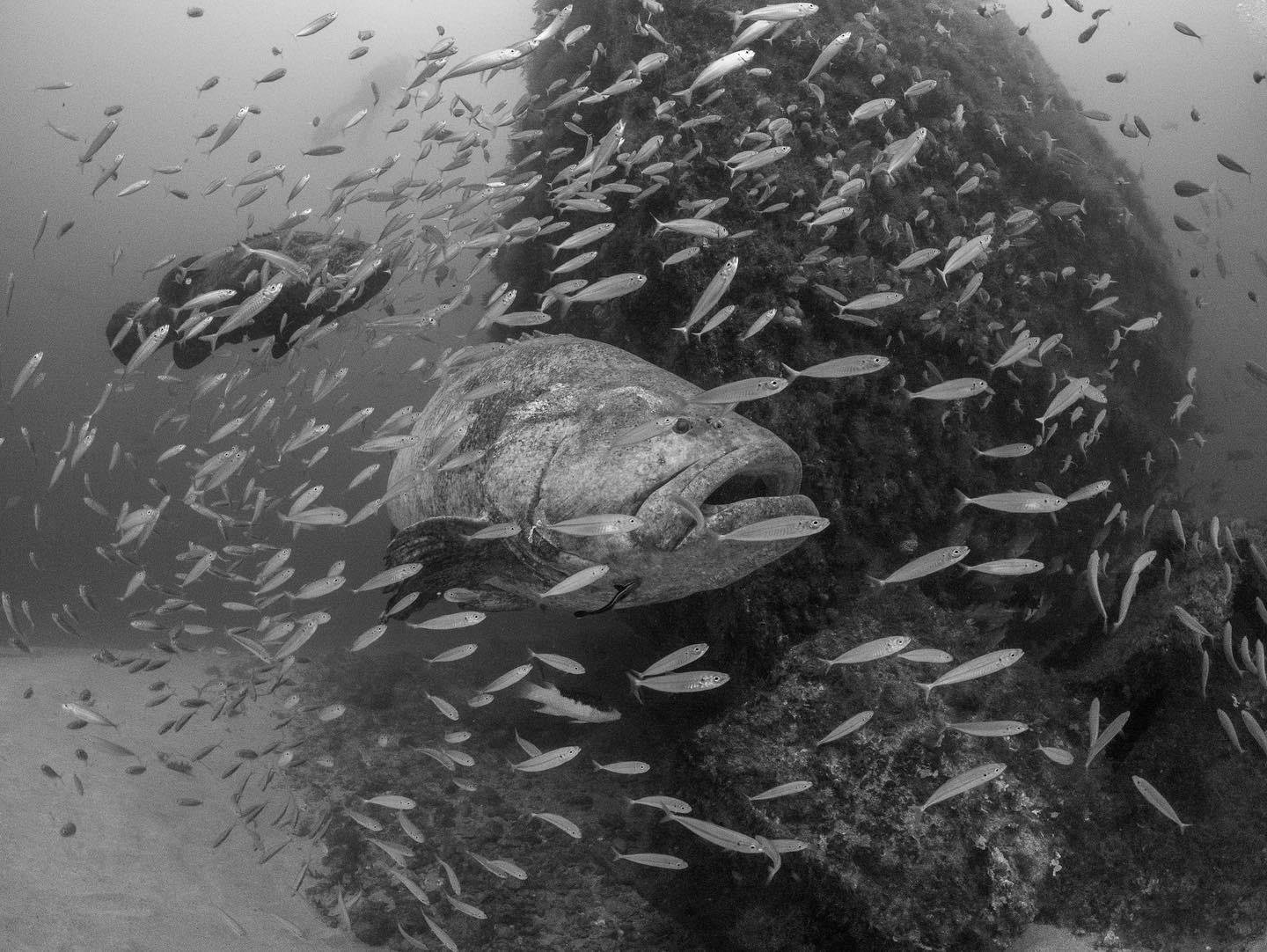Diving with the Goliath - A Local's Guide to Experiencing the Gentle Giants







As a photographer, it is my job to convey a story with images, to transplant people to places they have never been and to highlight scenes they have never experienced. Through many dives I have certainly tried, but I know I am yet to capture a photograph that adequately conveys the majesty of diving with the goliath grouper. It is impossible to describe with words or capture with mere photographs. Diving during the goliath aggregation here in Jupiter is something that truly needs to be experienced.
This relaxed goliath allowed me into its baitball for a quick snapshot. In a brief moment of zen, I was able to share this moment with the powerful predator - completely on its terms- and it was pure magic.
At the peak of the action thousands of baitfish envelope the massive groupers. During the best encounters the bait completely surround the goliath as they move together through the water in precise formations. It is a beautifully orchestrated event, with the baitfish moving in perfect unison around the goliath. Their dance is only temporarily disrupted by the reverberations of their barks. Yes, goliath bark underwater as a form of communication - it’s a sound so loud and powerful that you can actually feel the BOOM rumbling in your chest.
Baitfish close in around the resting goliath. At times it can be challenging to get a decent face shot of the massive fish if the bait ball is too thick.
Here in Jupiter we are fortunate to be able to regularly experience diving with several large animals - loggerhead sea turtles, multiple species of sharks, but my personal favorite remains the goliath groupers. Their aggregation typically occurs here between the new moons of August and September, give or take a couple weeks. In general, your best chances of diving with them in high numbers begin as early as late July and can go through October. Unfortunately, the last couple seasons have been cut a tad short in early October due to storms coming through, so earlier in the season is usually a safer bet.
We do have several resident goliath that we can reliably see along the reef.
While it is possible to have some incredible interactions along the reef, the goliaths primarily aggregate on our deeper wrecks. If you haven’t kept up with your diving skills throughout the year it is best to go out with either one of our private guides or seek out an advanced certification to prepare you for diving in the deep water and heavy currents. The Jupiter Wreck Trek is my favorite site to visit the Goliath - it is comprised of 3 separate wrecks that sit in roughly 90ft of water - the Zion, Miss Jenny and The Bonaire. Navigation can be tricky if you aren’t familiar with this site and visibility can be quite variable - one more reason to get a guide if it’s your 1st time. Each year I see divers get blown off the wreck, or lose the guide headed out to Bonaire and never quite make it out to that final wreck in the series, a frustrating experience that can be easily avoided with a little pre-planning and preparation.
Goliath grouper stacked up on the bow of the Zion, the 1st wreck in the series of 3 at the Jupiter Wreck Trek.
The wrecks where the goliath aggregate are deep and I highly recommend either seeking your advanced certification or hiring a private guide to come with you on your 1st dive here. Decompression limits are realized quickly in 90ft and it is easy to lose track of time when having epic interactions with these amazing animals!
When you initially descend on the Wreck Trek, if you’re lucky enough to hit peak season, it is not uncommon to find dozens of goliath stacked up on the bow of the Zion. Pro tip: I usually recommend going in a tad heavy for this dive so you can plant yourself in the stand and take in the show. A muck stick is another helpful tool that will allow you to move across the sand without having to kick and stir up the silt (a courtesy us photographers greatly appreciate).
Goliaths can reach up to 800lbs, essentially the size of a small car. It’s difficult to grasp just how large that is until you experience their mass in person. As intimidating as their size can be, they are generally very gentle around divers. I’ve had goliaths that are so relaxed in my presence, they let me get in their bait ball alongside with them and hang for an entire dive. When a giant predatory animal at the top of food chain allows you to get close and share their space without any threat, it is a magical experience.
A friendly goliath allows Divemaster Erick to chill in the bait ball with him. Their noses were practically touching!
While goliath are generally friendly and approachable, the only time I’ve seen them become aggressive is when a diver is hunting. They have an appetite for lobster in particular (can you blame them?) and I have personally had one follow me around for an entire dive grabbing each and every one I tickled out of its hole. While this can be a frustrating experience, we must always remember we are in their home, and they are within their rights to capitalize on an easy meal.
Divemaster Kayla gets up close with one of our resident goliaths - the famous “Sweetie.” Sweetie is sweet, until she sees you try to take some lobster . . . I have been personally robbed by her before!
Diving with the goliath is truly the experience of a lifetime and one I encourage anyone to plan a trip to Jupiter to experience. We do have some residents here on the reef such as Sweetie the Golaith that you can reliably interact with, but if you’ve never experienced the full-blown aggregation in the fall, then it is worth marking on your calendar.
A massive goliath makes a close pass in front of my dome port while diving at another well-known aggregation site, the MG-111 wreck.
Hope to see each of you out here next season, for the life-changing experience of diving with goliath grouper.
Safe Diving,
Grace













